
Related
The Biden administration is claiming the International Criminal Court has no jurisdiction to charge Israeli officials for war crimes. This comes after rumors that the ICC may be close to issuing arrest warrants for Israeli Prime Minister Benjamin Netanyahu and other Israeli officials over possible crimes in Gaza. The International Court of Justice has rejected a request by Nicaragua to order Germany to halt exporting arms to Israel, but the court declined to throw out the case. For more, we speak with human rights attorney and war crimes prosecutor Reed Brody, who says ICC charges would be a “huge” development. “Since Nuremberg, no international tribunal has issued an arrest warrant for a Western official. For decades, we’ve had this double standard where international justice has only been effective for crimes committed by leaders of developing countries or by enemies of the U.S. like Vladimir Putin,” says Brody.
Transcript
AMY GOODMAN: This is Democracy Now!, democracynow.org. I’m Amy Goodman, with Juan González.
Prosecutors from the International Criminal Court have interviewed staff from Gaza’s two biggest hospitals, according to Reuters, in what’s being described as the first confirmation that ICC investigators are speaking to medics about possible war crimes committed by Israel in Gaza. Palestinian officials have demanded investigations after hundreds of bodies were exhumed in mass graves at Nasser and Shifa Hospital following Israeli raids on the medical centers.
On Tuesday, Israeli Prime Minister Benjamin Netanyahu responded to news the ICC may be close to issuing arrest warrants for him and other Israeli officials.
PRIME MINISTER BENJAMIN NETANYAHU: The International Criminal Court in The Hague is contemplating issuing arrest warrants against senior Israeli government and military officials as war criminals. This would be an outrage of historic proportions.
AMY GOODMAN: This comes as the International Court of Justice has rejected a request by Nicaragua to order Germany to halt exporting arms to Israel, but the ICJ declined to throw the case out entirely. Nicaragua has accused Germany of violating the Genocide Convention by providing military and financial aid to Israel.
For more, we go to Reed Brody, a war crimes prosecutor, author of To Catch a Dictator: The Pursuit and Trial of Hissène Habré. He’s joining us from Barcelona, Spain.
Reed, can you first talk about this possibility that Prime Minister Netanyahu and others may be charged by the International Criminal Court, and the U.S. saying that the International Criminal Court doesn’t have the jurisdiction to do this?
REED BRODY: Well, of course, this would be huge, Amy. The International Criminal Court has never issued an arrest warrant for a Western official. Indeed, since Nuremburg, no international tribunal has issued an arrest warrant for a Western official. For decades, we’ve had this double standard where international justice has only been effective for crimes committed by leaders of developing countries or by enemies of the U.S. like Vladimir Putin.
We don’t know if this is true, but this would be a huge red line. I mean, you know, the Palestinians have been — and Raji Sourani has been on your show a number of times — have been fighting for 15 years to bring the ICC’s attention to alleged Israeli war crimes, back in — including illegal settlements in the West Bank. And the ICC, under three successive prosecutors, has given this slow walk to those complaints. And it was always assumed that this prosecutor, Karim Khan, a British barrister who came in with American support, was very reticent, would never actually cross that red line and indict an Israeli official. But I think the overwhelming evidence of atrocities, the disproportionate attacks, the indiscriminate attacks, the collective punishment of the people of Gaza, the international condemnation, and, frankly, also the genocide case brought by South Africa at the other court in The Hague, the ICJ, that resulted in a ruling by the ICJ essentially that Israel had a case to answer, these have all made it untenable now for the ICC not to act.
Now, of course, the U.S. position, as you’ve said, is that the ICC does not have jurisdiction because Israel has not ratified the ICC treaty. This is the historic position that the U.S. argued 25 years ago when we were drafting the ICC statute in Rome. But the U.S. was overwhelmingly outvoted, and the ICC has jurisdiction over nationals of countries that have ratified, so-called state parties, but also it has jurisdiction over crimes committed on the territory of states that have given authorization. And so, you know, when — but we saw under the previous ICC prosecutor, when she opened investigations into Afghanistan that potentially implicated American war crimes, when she finally opened an investigation into Israel-Palestine, that the Trump administration sanctioned the ICC for its temerity in investigating an act by officials of non-state parties. And even when those sanctions were lifted by the Biden administration, the U.S. said, “We don’t believe the ICC has jurisdiction over nationals of non-state parties.” But then Russia invaded Ukraine, and Russia began committing massive war crimes. And then, when the ICC — and, of course, Russia is also a non-state party. And when the ICC began to investigate Russia and issued an arrest warrant for Vladimir Putin, the U.S. celebrated that. So, now for the U.S. to go back and say, “Well, we loved it when you did it with Putin, but we think you’re crossing a red line when you do it with Israel,” of course, that’s just hypocrisy.
JUAN GONZÁLEZ: Reed, I wanted to ask you — one of the Israeli officials who spoke to The New York Times said that the possibility of the court issuing arrest warrants has been guiding Israeli decision-making in recent weeks. What’s the significance of this?
REED BRODY: Well, it shows, actually, that Israel is worried about this. Obviously, they can’t undo crimes that have already been committed. But many people say, “Well, you know, what’s the big deal? I mean, Netanyahu — I mean, in fact, the ICC, in 20 years, has never actually got its hands on, prosecuted and convicted any state official anywhere.” But the fact is that if the ICC issues this arrest warrant — and the furious diplomatic maneuvering that’s going on suggests that it may be imminent — of course, it represents, first of all, a profound moral rebuke for Israeli actions. It makes it impossible for people to say that Israel’s actions comport with the law. It also means that Benjamin Netanyahu could never — if he’s one of the people indicted, could never travel to an ICC state party for the rest of his life. He could never go to Europe. But it also — you know, it also suggests that, ultimately, any Israeli official involved in these kinds of activities, down the line, could potentially also be subject to an ICC investigation and indictment. So, it really, hopefully, would have not only a protective effect on the past, but a dissuasive effect on Israel’s actions in the future.
AMY GOODMAN: Reed Brody, I wanted to ask you about what’s coming up this summer. We’re speaking to you in Barcelona. You know, of course, Columbia just allowed police to raid the campus. Hundreds of students have been arrested. We’re moving into yet another Chicago Democratic convention. You wrote your college thesis on choosing — what happens when a presidential candidate drops out at the last minute and what that means. Can you make some parallels from ’68 to today?
REED BRODY: Well, sure. I mean, in 1968, we saw that the Democrats in Chicago nominated Hubert Humphrey, who was Lyndon Johnson’s vice president and a pro-war candidate, even though he had never won any presidential primary, even though Robert F. Kennedy, before he was assassinated, and Eugene McCarthy had garnered all the votes. And so you had this massive protest against a Democratic candidate who was pursuing a very unpopular war. And so, the whole primary, the whole Democratic selection process, was renovated, and so that you now have primaries and caucuses that result in pledged delegates.
The unfortunate, for the moment, result of that is that Joe Biden has now accumulated enough pledged delegates to the Democratic convention, so that no matter how unpopular he is among Democrats, no matter how unpopular he is as a candidate, he has enough delegates to secure the nomination. The only way that he can really be removed as the Democratic candidate is if he were to step down, in which case all of the delegates who are pledged to vote for him on the first ballot would then be released, and you’d have other candidates who could step in.
AMY GOODMAN: Well, we’re going to leave it there, but I want to thank you for being with us. Reed Brody is a war crimes prosecutor and author of To Catch a Dictator: The Pursuit and Trial of Hissène Habré. We’re going to continue the conversation and post it online at democracynow.org and also talk about the ICJ decision, the International Court of Justice.
I’m Amy Goodman, with Juan González. Democracy Now! is produced with Mike Burke, Renée Feltz, Deena Guzder, Sharif Abdel Kouddous, Messiah Rhodes, Nermeen Shaikh, María Taracena, Tami Woronoff, Charina Nadura, Sam Alcoff, Tey-Marie Astudillo, John Hamilton, Robby Karran, Hany Massoud, Hana Elias. Our executive director is Julie Crosby. Special thanks to Becca Staley, Jon Randolph, Paul Powell, Mike Di Filippo, Miguel Nogueira, Hugh Gran, Denis Moynihan, David Prude, Dennis McCormick, Matt Ealy, Anna Özbek. Our website is democracynow.org. You can get our podcasts there. Thank you so much for joining us.

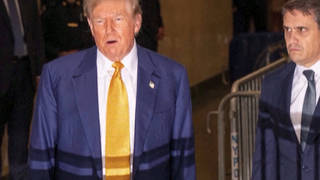
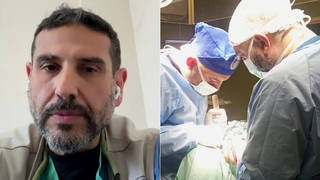
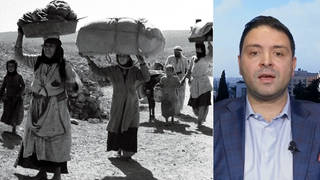
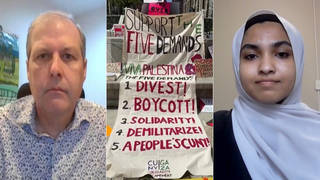
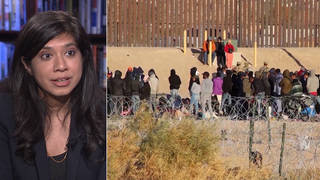




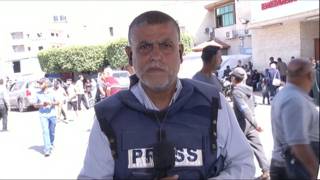
Media Options